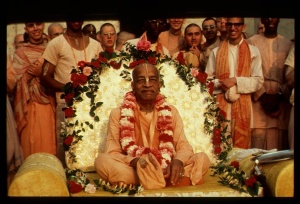SB 10.81.28: Difference between revisions
m (1 revision(s)) |
No edit summary |
||
| Line 1: | Line 1: | ||
{{info | {{info | ||
|speaker= | |speaker=Śukadeva Gosvāmī | ||
|listener=King | |listener=King Parīkṣit | ||
}} | }} | ||
[[Category:Srimad-Bhagavatam - Canto 10 Chapter 81]] | |||
[[Category:Bhagavatam Verses Spoken by Sukadeva Gosvami - Vanisource|108128]] | |||
<div style="float:left">'''[[Srimad-Bhagavatam]] - [[SB 10|Tenth Canto]] - [[SB 10.81: The Lord Blesses Sudama Brahmana|Chapter 81: The Lord Blesses Sudāmā Brāhmaṇa]]'''</div> | |||
<div style="float:right">[[File:Go-previous.png|link=SB 10.81.27]] '''[[SB 10.81.27]] - [[SB 10.81.29-32]]''' [[File:Go-next.png|link=SB 10.81.29-32]]</div> | |||
{{RandomImage}} | |||
{{SBnotice}} | |||
==== TEXT 28 ==== | ==== TEXT 28 ==== | ||
<div | <div class="verse"> | ||
prītaḥ svayaṁ tayā yuktaḥ | :prītaḥ svayaṁ tayā yuktaḥ | ||
praviṣṭo nija-mandiram | :praviṣṭo nija-mandiram | ||
maṇi-stambha-śatopetaṁ | :maṇi-stambha-śatopetaṁ | ||
mahendra-bhavanaṁ yathā | :mahendra-bhavanaṁ yathā | ||
</div> | </div> | ||
| Line 17: | Line 22: | ||
==== SYNONYMS ==== | ==== SYNONYMS ==== | ||
<div | <div class="synonyms"> | ||
''prītaḥ''—pleased; ''svayam''—himself; ''tayā''—by her; ''yuktaḥ''—joined; ''praviṣṭaḥ''—having entered; ''nija''—his; ''mandiram''—home; ''maṇi''—with gems; ''stambha''—columns; ''śata''—hundreds; ''upetam''—having; ''mahā-indra''—of great Indra, the King of heaven; ''bhavanam''—the palace; ''yathā''—like. | |||
</div> | </div> | ||
{{SBcollapse}} | |||
==== TRANSLATION ==== | ==== TRANSLATION ==== | ||
<div | <div class="translation"> | ||
With pleasure he took his wife with him and entered his house, where there were hundreds of gem-studded pillars, just as in the palace of Lord Mahendra. | With pleasure he took his wife with him and entered his house, where there were hundreds of gem-studded pillars, just as in the palace of Lord Mahendra. | ||
</div> | </div> | ||
| Line 31: | Line 36: | ||
==== PURPORT ==== | ==== PURPORT ==== | ||
<div | <div class="purport"> | ||
Śrīla Viśvanātha Cakravartī comments that Sudāmā was simply astonished at the sight of his wife. As he wondered, "Who is this demigod's wife who has approached such a fallen soul as me?" the maidservants informed him, "This is indeed your wife." At that very moment Sudāmā's body became young and beautiful, bedecked in fine clothing and jewelry. The word prītaḥ here indicates that these changes gave him considerable pleasure. | Śrīla Viśvanātha Cakravartī comments that Sudāmā was simply astonished at the sight of his wife. As he wondered, "Who is this demigod's wife who has approached such a fallen soul as me?" the maidservants informed him, "This is indeed your wife." At that very moment Sudāmā's body became young and beautiful, bedecked in fine clothing and jewelry. The word ''prītaḥ'' here indicates that these changes gave him considerable pleasure. | ||
The famous "Thousand Names of Viṣṇu" hymn of the Mahābhārata immortalizes Sudāmā's sudden opulence in the following phrase: śrīdāmā-raṅka-bhaktārtha-bhūmy-ānītendra-vaibhavaḥ. "Lord Viṣṇu is also known as He who brought Indra's opulence to this earth for the benefit of His pitiful devotee Śrīdāmā [Sudāmā]." | The famous "Thousand Names of Viṣṇu" hymn of the ''Mahābhārata'' immortalizes Sudāmā's sudden opulence in the following phrase: ''śrīdāmā-raṅka-bhaktārtha-bhūmy-ānītendra-vaibhavaḥ.'' "Lord Viṣṇu is also known as He who brought Indra's opulence to this earth for the benefit of His pitiful devotee Śrīdāmā [Sudāmā]." | ||
</div> | </div> | ||
__NOTOC__ | </div> | ||
</div> | |||
<div style="float:right">[[File:Go-previous.png|link=SB 10.81.27]] '''[[SB 10.81.27]] - [[SB 10.81.29-32]]''' [[File:Go-next.png|link=SB 10.81.29-32]]</div> | |||
__NOTOC__ | |||
__NOEDITSECTION__ | |||
Revision as of 12:05, 11 June 2021

A.C. Bhaktivedanta Swami Prabhupada
Please note: The synonyms, translation and purport of this verse were composed by disciples of Śrīla Prabhupāda
TEXT 28
- prītaḥ svayaṁ tayā yuktaḥ
- praviṣṭo nija-mandiram
- maṇi-stambha-śatopetaṁ
- mahendra-bhavanaṁ yathā
SYNONYMS
prītaḥ—pleased; svayam—himself; tayā—by her; yuktaḥ—joined; praviṣṭaḥ—having entered; nija—his; mandiram—home; maṇi—with gems; stambha—columns; śata—hundreds; upetam—having; mahā-indra—of great Indra, the King of heaven; bhavanam—the palace; yathā—like.
Translation and purport composed by disciples of Śrīla Prabhupāda
TRANSLATION
With pleasure he took his wife with him and entered his house, where there were hundreds of gem-studded pillars, just as in the palace of Lord Mahendra.
PURPORT
Śrīla Viśvanātha Cakravartī comments that Sudāmā was simply astonished at the sight of his wife. As he wondered, "Who is this demigod's wife who has approached such a fallen soul as me?" the maidservants informed him, "This is indeed your wife." At that very moment Sudāmā's body became young and beautiful, bedecked in fine clothing and jewelry. The word prītaḥ here indicates that these changes gave him considerable pleasure.
The famous "Thousand Names of Viṣṇu" hymn of the Mahābhārata immortalizes Sudāmā's sudden opulence in the following phrase: śrīdāmā-raṅka-bhaktārtha-bhūmy-ānītendra-vaibhavaḥ. "Lord Viṣṇu is also known as He who brought Indra's opulence to this earth for the benefit of His pitiful devotee Śrīdāmā [Sudāmā]."